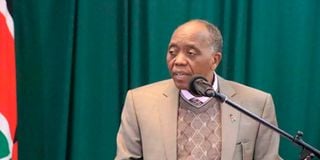Premium
Top security organ admits to meeting Chebukati over presidential poll results

Dr. Joseph Kinyua, chair of the Assumption of Office of the President Committee.
The National Security Advisory Council (NSAC) has admitted to meeting with elections body chairperson Wafula Chebukati on August 15 at the Bomas of Kenya, but denied claims that its team attempted to influence the outcome of Presidential poll results.
The NSAC has asked the Supreme Court to give it audience in eight petitions seeking to nullify results of the Presidential election results so as to address claims Mr Chebukati made that it tried to tilt the race in favour of former Prime Minister Raila Odinga.
Intelligence reports that delays in tallying and transmission of results had caused anxiety in some parts of the country which necessitated a meeting with IEBC bosses to clear the air, the NSAC now says.
Independent Electoral and Boundaries Commission (IEBC) chairperson Wafula Chebukati and another member of the polls body, Abdi Guliye, made the allegations against the NSAC.
Mr Chebukati and Prof Guliye claimed that NSAC sent a team comprising of Principal Administrative Secretary in the Office of the President Kennedy Kihara, Solicitor General Kennedy Ogeto, Police boss Hillary Mutyambai and Lieutenant General Francis Ogolla to Bomas.
In their affidavits, the IEBC chiefs claim the NSAC said that a result against Mr Odinga would plunge the country into chaos.
Mr Kihara now says that the NSAC team only went to Bomas to discuss security concerns in relation to delays in results transmission for the Presidential election, before briefing the IEBC chair on Kenya’s safety situation.
“The said meeting was necessitated by the fact that the NSAC, in the discharge of its mandate, had become seized of information to the effect that delays in declaring the results of the Presidential election, and the manner in which the results were being transmitted, including the stoppage of the public display of results, had generated considerable public anxiety and tension, and risked creating opportunity for chaos in parts of the country,” Mr Kihara says in his affidavit.
Mr Chebukati had snubbed other requests by the NSAC for a meeting, Mr Kihara adds.
“As the leader and spokesperson of the above-named delegation, I did not at any time urge or implore the IEBC and Mr Chebukati to declare results in favour of any particular candidate in the Presidential election. Our presentation to the IEBC and Mr Chebukati, on behalf of the NSAC, concerned the need to expedite the process of declaring the result and ensuring transparency in order to avert public anxiety and suspicions that were gradually beginning to degenerate into chaos and violence in various parts of the country,” Mr Kihara adds.
Head of Civil Service and Chairperson of the NSAC Joseph Kinyua has also sworn an affidavit denying Mr Chebukati’s claims.
Mr Kinyua holds that the fact that NSAC issued a press release assuring Kenyans of safety in the country after declaration of results is an indication that the council did not have a preferred candidate in the election.





